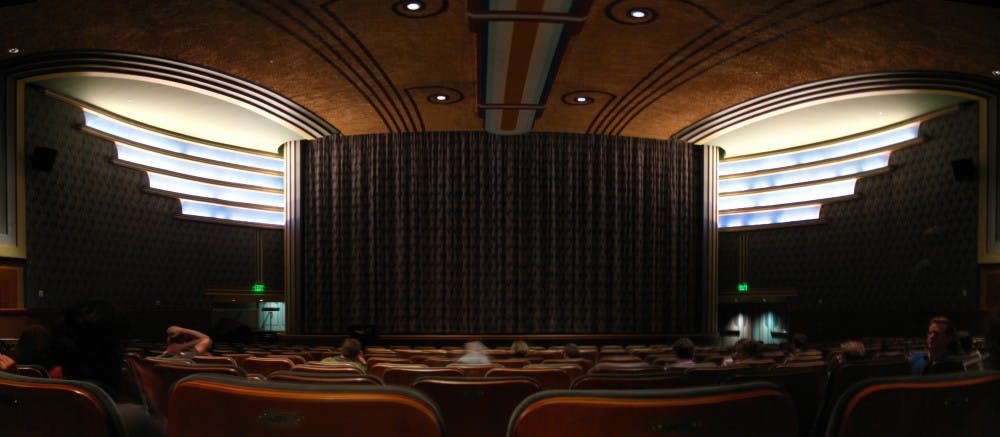The room crackled with the sweet smell of popcorn and the hum of students chattering over dinner prepared by the New College House chefs. The Penn Student Film Festival concluded its annual run from March 26–28. This year’s edition saw 24 films submitted, and two days of screenings taking place at Gregory and Harrison College Houses and a gala dinner and awards night at New College House. The festival screened eight finalist films by student filmmakers Adam Ginsberg (C '19), Emily Hason (C '18), Luke Yeagley (E '20), Barry Oshiba (C '18), Amanda Prager (C '18), Yuhui Ma (C '20), Christopher Powell (E '19), Daniel Fradin (C '19), Arlo Gordon (C '18), and Alden Hallak (C '18).
The subject matter varied dramatically with films exploring the experience of being an international student at Penn to meta–commentary on “slasher films” to the myriad of possibilities behind a closed door.
Amanda Prager (C '18) took home the top prize of the night for Coffee Break. She’d been working on the script and pre–production for the film since last summer, and collaborated with some students from the premier film program at Chapman University for production. She also gave special credit to her fellow schoolmate, Nicholas Escobar, who “scored the film in just three hours.”
Coffee Break’s title is a play on words—the film is set in a coffee shop, but the characters also experience heartbreak. Amanda has had several films in the Penn Student Film Festival over the years and shared that this first prize win in her senior year was a “good way to cap things off.” She also had much to praise about this year’s festival, pointing out that “it’s the best [she’s] seen in her four years here,” with a high level of organization and standards.
Second prize went to Christopher Powell (E '19) for Slashed, a quirky short that combined a traditional horror set–up with film analysis. He made use of footage he shot on a 16mm camera as well as clips from many horror films. Though his coursework is mainly in engineering, he’s always loved film and jumped at the opportunity to take film classes at Penn, and "particularly enjoyed Video I and Documentary Video with Michael Crane."
Slashed showed keen awareness and knowledge of horror and his sarcastic quips and voiceover brought much laughter from the audience throughout the film’s screening. This is the first time Chris has submitted a film to the Penn Student Film Festival, and he plans to use the prize money to treat friends who helped him with his film after covering the cost of production.
Sponsored by the College Houses, the Penn Student Film Festival is a platform to showcase student works and support the growing film community. Ryan Keytack, the Director of Residential Programs, noted that the festival “reinforces what [residential life] was about—a partnership between departments, faculty, and students.” Frank Pellicone, who teaches courses on Italian cinema and is the House Dean of Harrison College House, shares that it’s nice to see “what subjects students think are relevant to their experiences.”
Associate Director of Penn’s Cinema Studies program and Harrison House fellow Nicola Gentili remarked that there has been a considerable improvement in the quality of works submitted to the festival over the years. He also finds it heartwarming that many students collaborate and help each other out in their films; in this year’s festival, it is not hard to find names in common between two or more shorts. Christopher Donovan, House Dean at Gregory College House, echoed that it is not difficult to find “students working on each other’s movies.” Nicola adds that he appreciates the “sharing of knowledge” and techniques within the community.
When asked for advice she would give to students interested in making films at Penn, Amanda emphasizes that the first step is to find people to make films with, since film is such a collaborative medium. Once you have “one other person, usually two” who have the same willpower and drive, “the film will be made.” She also encourages aspiring student filmmakers here to just keep making films, as they will improve over time.
“The first film will always be awful, no matter what,” Amanda quips, “so just make that first film and keep learning from there.” Christopher echoed similar advice, “You’re gonna make a lot of bad ones. Keep making bad ones, don’t show them to anyone, and then one day you’ll make good ones and you can show them to people.”
As someone who is about to graduate in just over a month, Amanda is unfazed. “My future plans are to still ultimately continue creating work,” Amanda muses, “there isn’t anything definite about my future plans, but this is not as scary as it used to be.”

